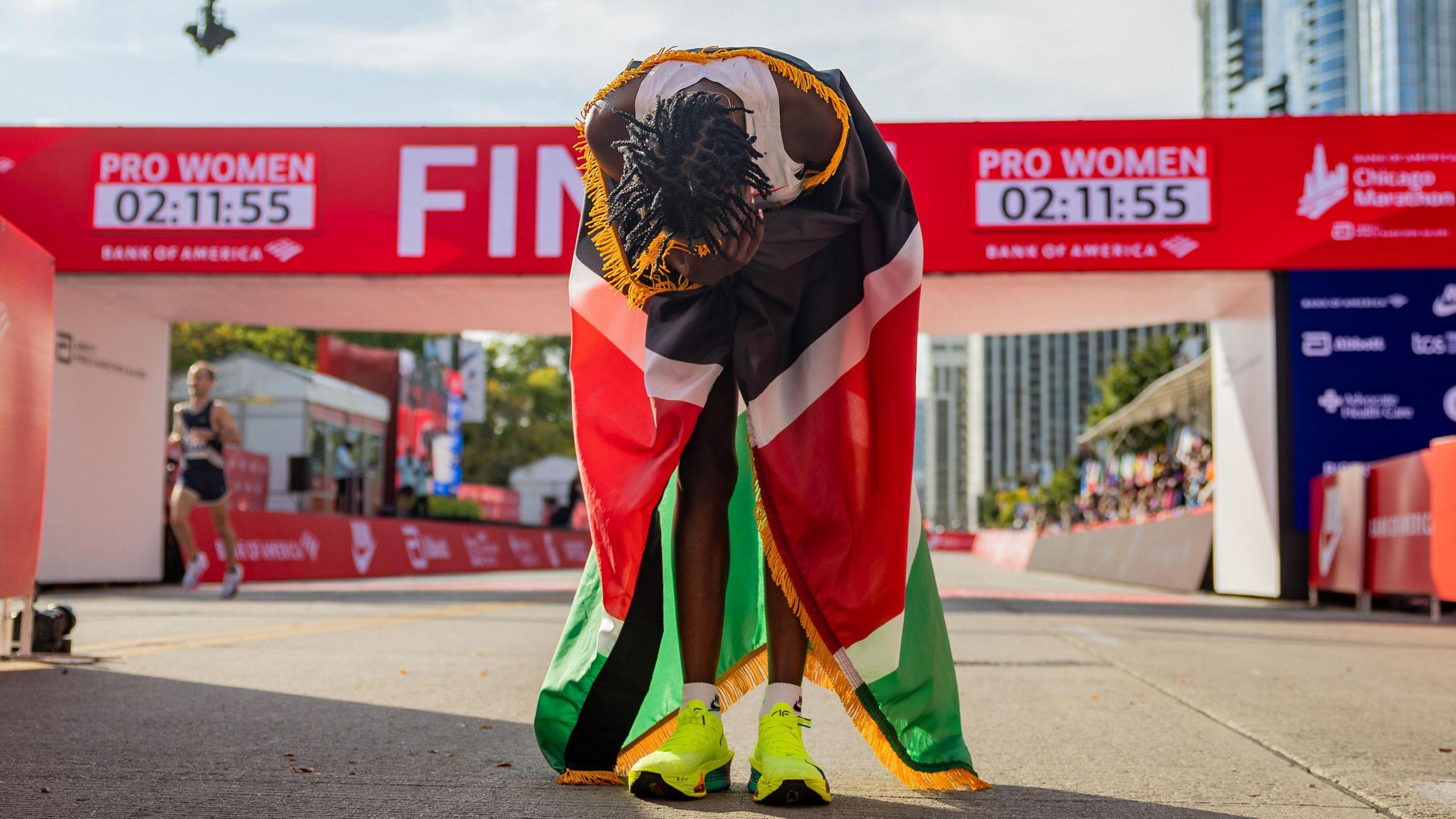The stats and shoes behind Chepngetich's amazing marathon world record

Chepngetich has won three of the past four Chicago marathons
- Published
Ruth Chepngetichās performance at the Chicago Marathon on Sunday shredded record books and reset expectations on what might be possible over 26.2 miles.
The Kenyan clocked two hours nine minutes 57 seconds, taking nearly two minutes off Ethiopian Tigst Assefa's world record.
But the detail below the headline time was just as jaw-dropping.
Chepngetich came through the halfway mark in 1:04:16, which would have been the fifth-fastest womenās half-marathon time in history.
The 1:05:41 she ran for the second half of the race would have been 36th on the all-time list.
In total, her marathon was the equivalent of running more than eight and a half Parkruns, clocking 15mins 24secs for each.
Only 10 competitors in the menās race in Chicago managed to beat 30-year-old Chepngetichās time.
Indeed, on World Athletics scoring tables which are designed to benchmark performances across disciplines and between genders, her performance was ranked equivalent to a 1:59:37 menās marathon.
In reality, the menās world record is almost a minute slower.
The result lopped a massive 4mins 22secs off Chepngetichās previous best ā a victory in the same race in 2022.
Chepngetich won a sweltering late-night marathon at the 2019 World Championships in Qatar
Chepngetich has considerable history in the marathon, winning the world title in Qatar in 2019 and coming within 14 seconds of success in a previous world record attempt.
However, her stark improvement against the clock has become more familiar in the 'supershoe' era.
Between 1988 and 1998 the menās marathon world record was unchanged.
Now the breakthroughs are more regular and more significant.
In a little over 10 years, the menās mark has dropped four times, with nearly three minutes wiped off the clock.
Chepngetichās mark is the third new womenās world record in five years, with the fastest womenās time over 26.2 miles dropping by five and half minutes in that period.
High-tech foams, carbon plates and pressurised airbags have combined in the soles of the latest shoes to return more energy to athletes, sparking an arms race among manufacturers.
World Athletics has moved quickly to regulate shoe technology.
Chepngetich was wearing Nikeās Alphafly 3, one of hundreds of different models that have been checked, validated and published on the
The regulations over shoe technology stretch over and include restrictions on the development of āintelligentā shoes which might change sole composition across different parts of a runnerās stride pattern.
Manufacturers are allowed to supply sponsored athletes with prototype shoes which are not yet available to the public for testing purposes outside Olympic Games and World Championships.
However, other approved shoes must be or have been available to the general public. Chepngetichās chosen pair retail at Ā£285.
Kenyan distance running has been beset by doping scandals in recent years, and Chepngetich was asked about doping after her victory in Chicago.
Former marathon world record holder Wilson Kipsang, former half-marathon world record holder Abraham Kiptum, Rio 2016 Olympic marathon champion Jemima Sumgong and London Marathon winner Daniel Wanjiru are among those to have been banned.
World Athletics president Lord Coe visited Nairobi in January 2023, but Kenya's anti-doping agency says it has since been weakened by budget cuts from the government.
Asked whether she could understand why the positive tests might cause some fans to doubt her new world record, Chepngetich said: "People must talk."